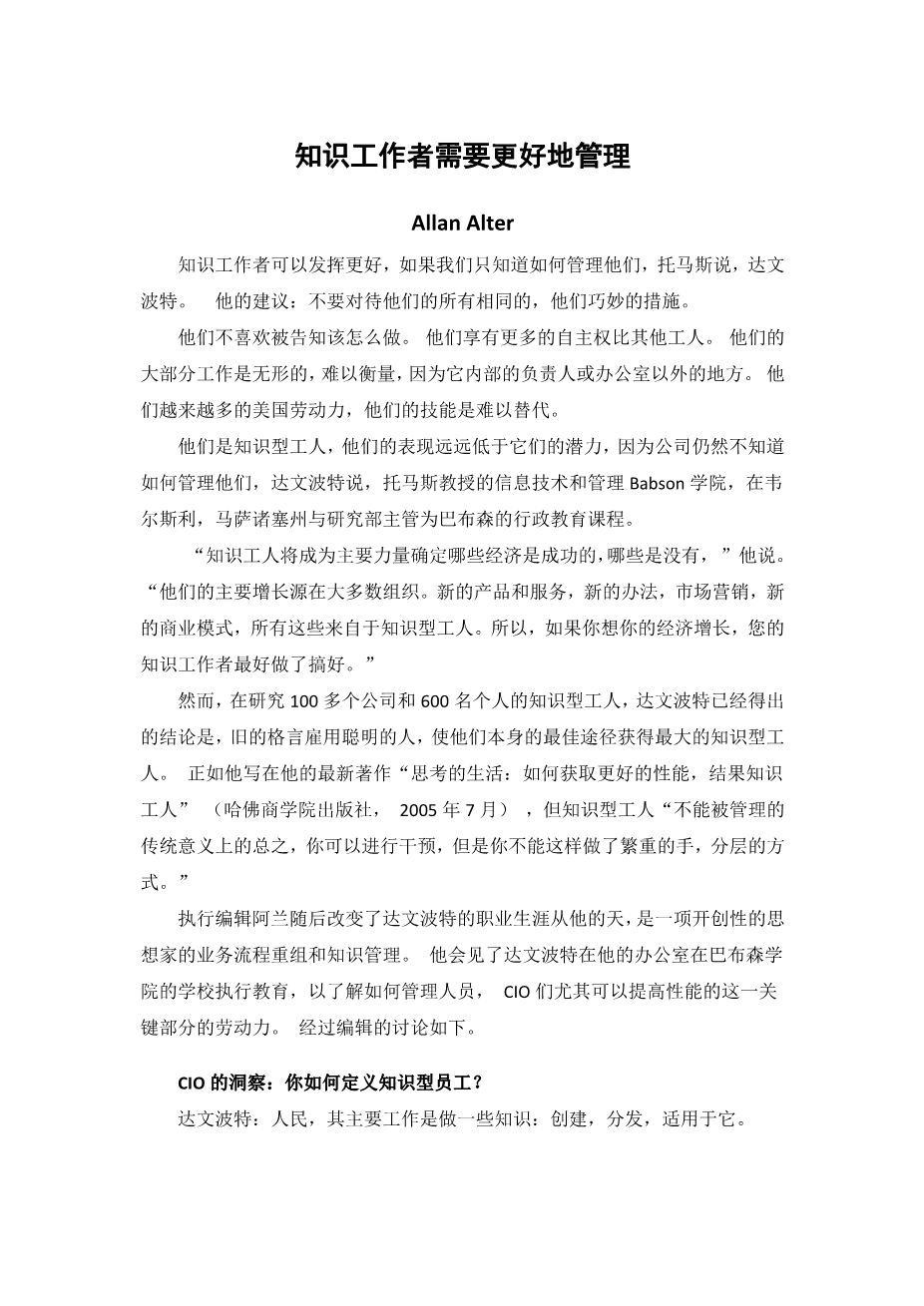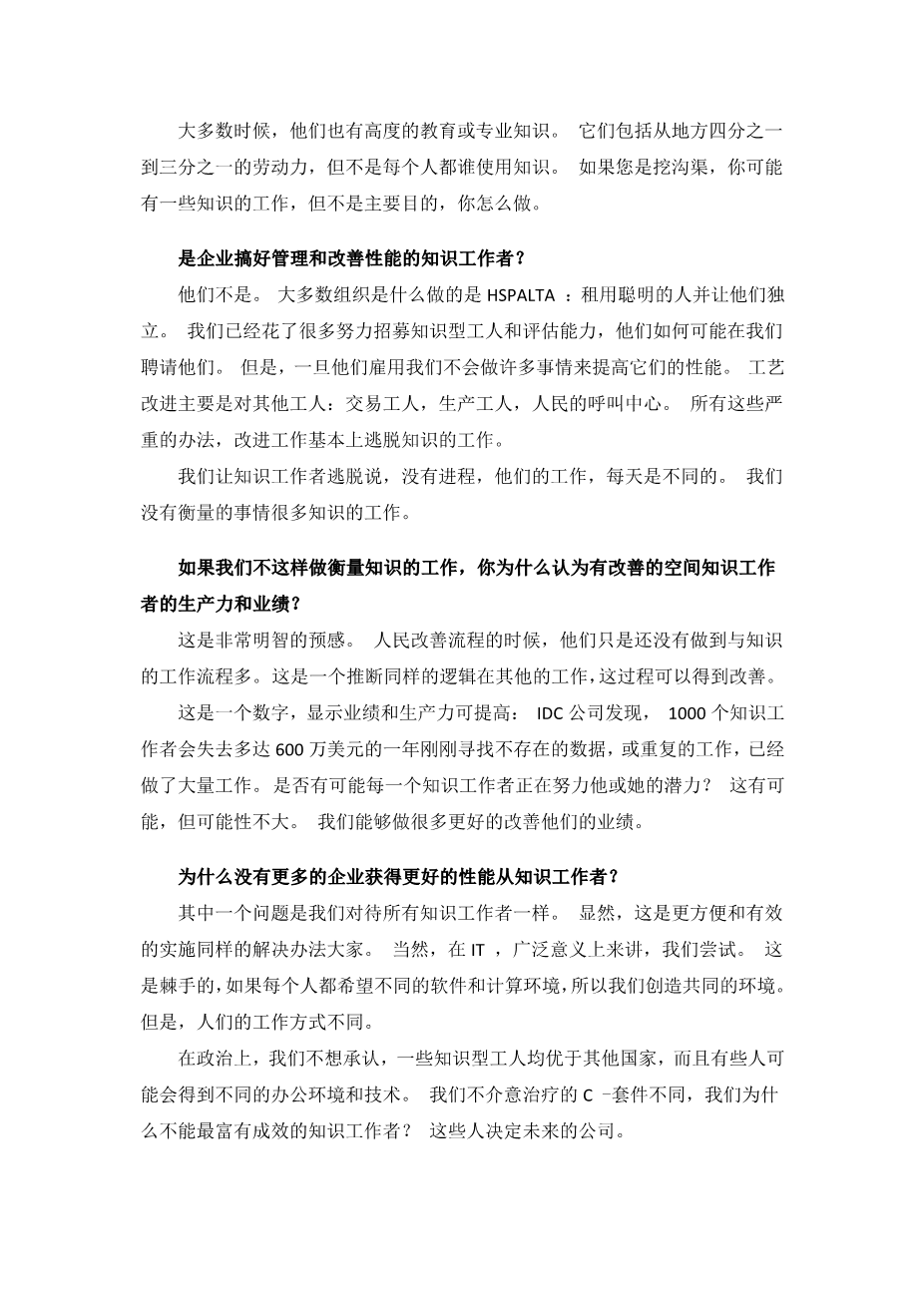Knowledge Workers Need Better Management
By Allan Alter
Knowledge workers could perform much better if we only knew how to manage them, says Thomas Davenport. His suggestion: Don't treat them the all same, and measure them tactfully.
They don't like to be told what to do. They enjoy more autonomy than other workers. Much of their work is invisible and hard to measure, beca-use it goes on inside their heads or outside the office. They are a growin-g part of the U.S. workforce, and their skills are hard to replace.
They're knowledge workers, and they are performing well below the-ir potential because companies still don't know how to manage them, sa-ys Thomas Davenport, professor of information technology and manage-ment at Babson College, in Wellesley, Mass., and director of research for Babson's executive education program.
"Knowledge workers are going to be the primary force determining wh-ich economies are successful and which aren't," he says. "They are the k-ey source of growth in most organizations. New products and services, n-ew approaches to marketing, new business models—all these come fro--m knowledge workers. So if you want your economy to grow, your know-ledge workers had better be doing a good job."
Yet after studying more than 100 companies and 600 individual kno--wledge workers, Davenport has come to the conclusion that the old dict-um of hiring smart people and leaving them alone isn't the best way to g-et the most out of knowledge workers. As he writes in his latest book, "T-hinking for a Living: How to Get Better Performance and Results from Kn-owledge Workers" (Harvard Business School Press, July 2005), although knowledge workers "can't be managed in the traditional sense of the wo-rd, you can intervene, but you can't do it in a heavy-handed, hierarchical- way."
Executive Editor Allan Alter has followed Davenport's career from hi-s days as a pioneering thinker on business process reengineering and kn-owledge management. He met with Davenport in his office at Babson C--ollege's School of Executive Education in order to learn how managers, a-nd CIOs in particular, can improve the performance of this critical segme-nt of the workforce. An edited version of their discussion follows.
CIO Insight: How do you define knowledge workers?
DAVENPORT: People whose primary job is to do something with knowl--edge: to create it, distribute it, apply it.
Most of the time they also have a high degree of education or expertis--e. They include anywhere from a quarter to a third of the workforce, but not everyone who uses knowledge. If you are digging ditches, you may h-ave some knowledge on the job, but it's not the primary purpose of wha-t you do.
Are companies doing a good job of managing and improving the performance of knowledge workers?
They're not. What most organizations do is HSPALTA: Hire smart people and leave them alone. We've spent a lot of effort recruiting knowledge workers and assessing howcapable they might be before we hire them. B-ut once they're hired we don't do a lot to improve their performance. Pr-ocess improvement has mostly been for other workers: transactional wo-rkers, manufacturing workers, people in call centers. All the serious appr-oaches to improving work have largely escaped knowledge work.
We let knowledge workers get away with saying there's no process to t--heir work, that every day is different. We don't measure much of anythi--ng about knowledge work.
If we don't measure knowledge work, why do you think there's room to improve knowledge worker productivity and performance?
It's a pretty well-informed hunch. People improve processes all the tim--e; they just haven't done it with knowledge-work processes as much. It's an extrapolation of the same logic in other work, that processes can be i-mproved.
Here is one number that indicates performance and productivity can b--e improved: IDC found that 1,000 knowledge workers can lose as much as $6 million a year just searching for nonexistent data, or repeating wor--k that has already been done. Is it possible every knowledge worker is w-orking to his or her potential? It's possible, but unlikely. We can get a lot better at improving their performance.
Why aren't more companies getting better performance from knowledge workers?
One of the problems is we treat all knowledge workers alike. Obviously it's more convenient and efficient to impose the same solution on everybody. Certainly in IT, broadly speaking, we try to. It's troublesome if everyone wants different software and computing environments, so we creat-e common environments. But people work in different ways.
And politically, we don't want to admit that some knowledge workers a-re better than others, and that some might deserve different office envir-onments and technologies. We don't mind treating the C-suite differentl-y—why not our most productive knowledge workers? These are the peo-ple determining the future of your company.
Companies have spent billions on IT to help knowledge workers. Why aren't our knowledge workers getting more from all these investments?
Most people feel more productive, and in part they are. But we spend a huge amount of time futzing around with stuff. Most organizations hav--e no training or education on how to use these tools effectively in their work. Call somebody in a big organization and say, "Transfer me to your c-olleague Bruce down in accounting," and 90 percent of people will say, "Gee, I'm not really sure I remember how to transfer. Here's Bruce's number just in case."
We've had call transfer capabilities for 40 years in organizations. Why can we still not use them? The same thing is true of all these other device-s—laptops,
剩余内容已隐藏,支付完成后下载完整资料


英语译文共 11 页,剩余内容已隐藏,支付完成后下载完整资料
资料编号:[468768],资料为PDF文档或Word文档,PDF文档可免费转换为Word
您可能感兴趣的文章
- 薪酬满意度作为工作满意度的先行因素:建立一个回归模型,确定公共和私人组织中薪酬满意度与工作满意度之间的线性关系外文翻译资料
- 胜任力与胜任力、胜任力模型与胜任力模型的比较研究外文翻译资料
- 如何提高企业网络招聘的有效性外文翻译资料
- 为初级职位招聘大学生,在制定战略和战术校园招聘计划时,需要考虑哪些问题?外文翻译资料
- 基于能力的招聘:招聘和留住成功员工的关键外文翻译资料
- 员工培训对体育门票销售人员工作满意度的影响外文翻译资料
- 由雇主参与的创新型员工激励模式外文翻译资料
- 浅析企业文化与企业绩效的相关性 ——以苏州金色未来信息咨询股份有限公司为例外文翻译资料
- 互联网背景下基于平衡计分卡的计算机绩效评价系统外文翻译资料
- 提高斯洛伐克公共行政部门招聘过程的效率外文翻译资料


